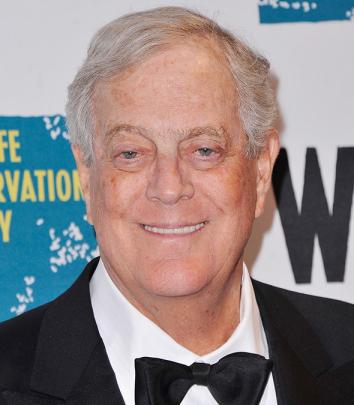The rise of the super PAC in the 2012 presidential election seemed like the pinnacle of Big Money politics—an unprecedented expansion of fundraising and donor influence.
But that was then. For 2016, the pioneers of that kind of politics—conservative billionaires Charles G. and David H. Koch—have found a new summit. According to the New York Times, the siblings plan to spend close to $900 million on next year’s campaign, with incursions into the Republican presidential primary. At more than double the roughly $400 million the Koch brothers spent in 2012, this money would go to polling, analytics, advertising, grassroots campaigns, single-issue advocacy groups, and more.
For comparison’s sake, in the last presidential election, the Republican National Committee—along with the National Republican Congressional Committee and the National Republican Senatorial Committee—spent a total of $657 million. It’s Democratic counterparts, likewise, spent a total of $647 million. The committees spent somewhat smaller amounts in the 2008 election and are likely to spend similarly larger amounts next year.

Photo by Stephen Lovekin/Getty Images
In its description of the Koch creation, the Times notes that it involves roughly 300 other donors and “includes groups like Freedom Partners, a trade organization overseen by Koch advisers that plans the retreat and helps corral contributions; Americans for Prosperity, a national grassroots group; and Concerned Veterans for America, which organizes conservative veterans.” Another way to put this is that the organization is something of a joint effort on behalf of the kinds of people who already participate in Republican politics. In the same way that a person who collects 100 votes is more valuable to the party than someone who just votes, these donors and activists strengthen their position by operating under a single umbrella.
Specifically, they make themselves a powerful force in the fight to pick a presidential nominee. For the candidate, a huge part of running for president is building consensus. To have a chance at winning, you need to at least satisfy the constituent groups of the party, and in particular, those groups with the greatest resources. In practice, this means that the traditional factions of the Republican Party—Wall Street managers, longtime regulars, elected leaders, political pundits, and assorted business people—hold a lot of sway over the outcome. Challenge the interests of bankers, and you might have to find new donors for your campaign. Attack military interventions, and you might miss an important endorsement from a prominent magazine. In 2016, you can add another step to this dance: Cross the Koch brothers—on climate change or economic regulations or any of their other pet issues—and you risk losing an important source for help and money.
Indeed, there’s a chance this Koch organization will stand as an institutional base (a counter-establishment of sorts) for a viable candidate who doesn’t have general appeal or is competing with other candidates in the same position. Wisconsin Gov. Scott Walker has broad appeal within the Republican Party. An evangelical Christian, he defeated public-sector unions in a fight over collective bargaining, survived a recall pushed by his opponents, and won re-election while pushing conservative reforms in a liberal state. He excites the kinds of party activists who dominate primaries and caucuses but has the polished appearance of a traditional nominee.
His main problem is that there are other candidates who satisfy key concerns for large parts of the party and who also bring substantial financial backing. When you can have a familiar name like Jeb Bush or are a quasi-icon like New Jersey Gov. Chris Christie, why would you go for Walker?
But the huge presence of David and Charles Koch changes that calculation. They give Walker better ground to stand on. He can run an insurgent campaign, and unlike Mike Huckabee in the 2008 race, he won’t run out of cash. Suddenly, there’s a real alternative to the original consensus candidate, and the two are forced into serious competition, which can reveal hidden strength or highlight unnoticed weakness. And if Walker loses the nomination, then at least the Kochs have made themselves an even stronger force in Republican politics—a fourth leg to the GOP coalition.
For liberal observers, there’s a certain irony to these moves and machinations. In Democratic politics, the Koch brothers are real-life bogeymen, avatars of rapacious greed and a dangerous threat to our public institutions. But in Republican politics, the Koch brothers may become a new tool for accountability: a way for less powerful parts of the party to ignore the usual gatekeepers and exert their will.
And if we see something different from the Kochs in the next year, then this is still a fascinating development in American politics, if not an entirely unprecedented one. In the industrializing America of the late 19th century, business leaders spent huge sums to keep politicians from regulating industry and taming their activities. If this marriage of extreme wealth and mass politics was the norm for the first Gilded Age, then there’s no reason it should be different for the second one.